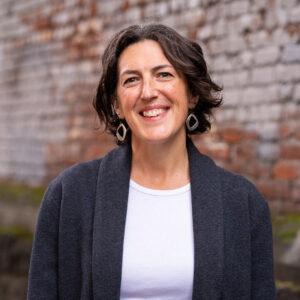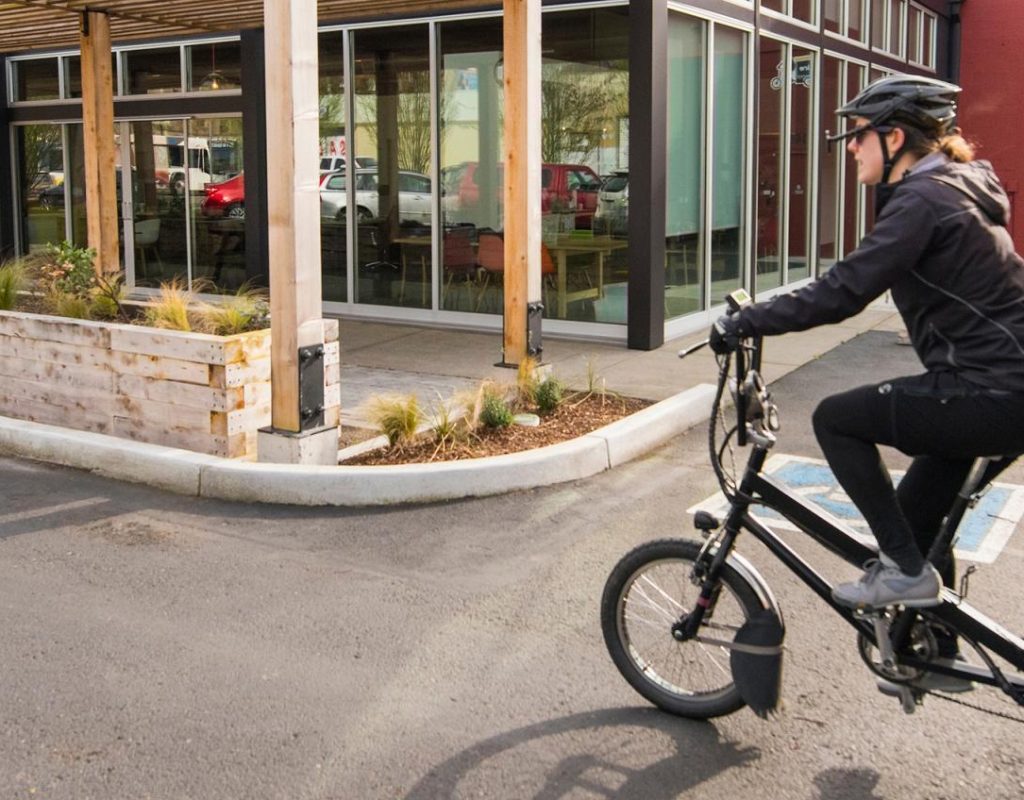
Communications Director
Cold storage at the Redd by Shawn Linehan.
As Oregon shifts to shelter-in-place, the Redd on Salmon Street remains a hub of activity, serving urgent food systems demands and adapting to serve mid- and long-range needs. This week we connected with the Redd campus manager, B-Line founder, and Ecotrust’s VP of events and engagement for an update and outlook from the Redd on Salmon Street.
Right now, across the region and the nation, people are experiencing dramatic shifts or amplified gaps in their relation to food security and access. In addition, food businesses are taking stock of the rapidly evolving reality, causing some to shift their model and others to close entirely. Meanwhile, spring gatherings that bring people together to learn, celebrate, and raise funds for critical community work must be reconfigured. In other words, the resilience and interconnectivity of our food system is being put to the test. In 2015, Ecotrust rallied investments behind the the Redd on Salmon Street, and the idea that a mid-sized hub dedicated to supporting regional infrastructure could help build much needed resilience in a system dedicated primarily to serving up an industrial model.
Below, we talk with Emma Sharer, campus manager of the Redd on Salmon Street; Franklin Jones, founder of core Redd tenant B-Line Urban Delivery; and Jeanne Kubal, Ecotrust vice president of events and engagement, about what is happening now at the Redd and how they are working with the community to adapt and respond with heart and creativity to the challenges ahead.
Emma: Plainly put, everyone here is really busy trying to get s&*t done and get food out in the world. My top priority right now is working alongside our facilities coordinator Bill Maddrell to keep the campus open and highly functioning for our tenants who are producing and distributing the food we need in our community right now. This means implementing heightened sanitation and cleaning and keeping up-to-date on all new orders and guidelines. We’re coordinating side-by-side with the core tenants still operating in the space—B-Line, Wilder Land & Sea, New Foods Kitchen, and Evergreens—to determine what we need to do to adapt to this moment and keep functioning.
FoodCorps has pivoted to remote work for now and are providing leadership, gathering COVID-19 response resources for their community of kids, families, schools, and service members. At the Powerhouse Café, we’ve worked with Eli Marroquin to create a website for Portland Pupusas y Taquería, to better pivot his business to offer takeout.
Wilder Land & Sea has launched a protein box as of today to shift their restaurant delivery model temporarily to a direct-to-consumer box that supports regional ranchers and fishermen and feeds hungry people in our community.
New Foods Kitchen continues to provide space to companies like Ground Up PDX, One Stripe Chai, and Divine Pie, who use B-Line for deliveries to New Seasons Market. Joe Miller, owner of New Foods, has kitchen hours available on Fridays and weekends for folks looking for plant-based production space. He’s also engaged with the farmers market community to support businesses looking to sell into the newly formed and emerging online farmers market platform.

Franklin: As a warehousing and last-mile delivery service, we are seeing a lot of volatility right now—really strong demand at retail grocers, changing needs and capacities of local producers, and seriously impacted restaurants and offices. Like Emma, we’re working diligently to keep our staff and community safe while we support each other.
Jeanne: Events at Redd East are temporarily on hold. But we are still managers of this high-capacity, highly functioning space in the heart of the city. We’re working right now to determine how we might mobilize that in support of this moment. We are in close contact with the caterers, audiovisual companies, rental companies, and event organizers understanding what opportunities there are to come together and support each other.
What near-term pivots are you making at the Redd to meet this moment?
Emma: As Franklin mentioned above, our tenants are seeing significant shifts in their markets, away from restaurants, towards higher demand from grocers and safe direct-to-consumer pathways, and we are working to support that. Some of these shifts are making some spaces at the Redd underutilized, so we are exploring a couple different opportunities to connect current tenants and services with partners who identify as Black, Indigenous, or people of color to run concepts out of those spaces.
We are learning more every day about what kinds of pivots food systems partners are needing to make and figuring out what role infrastructure—physical space, warehousing and delivery services, and digital platforms—can play in supporting those shifts in the near-term.
Franklin: We have been able to maintain the already strong Green Wheels program with New Seasons Market and make sure small producers and vendors within our region’s food system can still get their products to market. As restaurant and office deliveries are on hold, we are looking to see how we can expand our retail support and potentially reach neighbors who are homebound with good, local food.
Jeanne: In process! We are collaborating with Redd tenants and reaching out to partners and contacts in the city to determine the needs, the gaps, and where we might be able to make an impact in the near-term.

Emma: I think this time is going to make us all aware of the importance of strong regional food systems in a very immediate way. Nathan Kadish [Ecotrust Investments] and I are already fielding calls from partner organizations and funders to accelerate opportunity for collaboration with the Redd Manager and respective businesses on-site. We are also broadening our regional network relationships to leverage supply-and-demand partners who can be connected to on-site services available at the Redd today. We know what we are learning now can help make any new iteration of the Redd even stronger.
There will be funds available for small businesses and regional food producers in the coming weeks, and we are working hard to figure out how to connect Redd community members and other small-scale regional producers to those resources. And we are asking how other infrastructure-related resources like digital platforms can work with what we have built at the Redd to meet producers’ near-term needs to shift their market channels and longer-term needs to rebuild.
Franklin: We don’t know how the coming weeks will unfold and how much more we will need to rely on local and regional supply chains. In the days and weeks ahead, we will be looking to work with our partners to enact creative solutions for moving goods to people in a manner that is safe to all involved. We need innovation right now, and in a lot of ways, we are in a good position to do that.
Jeanne: We are all present to the reality and challenges our community is facing right now and supporting that fully. But as an events team, we are also looking ahead to the day when we can open our doors once again. As soon as it is safe to do so, we cannot wait to welcome back human connection and the power of convening to the campus. We know that once we come out of this challenging and somewhat isolating time, the importance of gathering as a community will never feel more necessary and important.

Blog
Our team works with the Keex’ Kwaan Community Forest Partnership to keep safety top of mind in planning the summer season.

Blog
Angela Hedstrom shares current challenges around keeping farm to school relationships afloat during the COVID-19 crisis.

Blog
In a collaboration with the Redd on Salmon Street and Ecotrust, Feed the Mass is preparing, delivering, and serving hundreds of free meals every week.